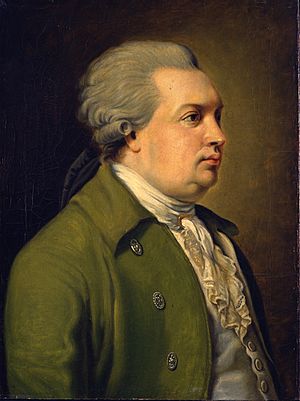Denis Fonvizin facts for kids
Quick facts for kids
Denis Fonvizin
|
|
|---|---|
 |
|
| Born | Denis Ivanovich Fonvizin 14 April 1745 Moscow, Russian Empire |
| Died | 12 December 1792 (aged 47) Saint Petersburg, Russian Empire |
| Resting place | Lazarevskoe Cemetery, Saint Petersburg |
| Occupation | Writer, playwright, translator |
| Nationality | Russian |
| Alma mater | Imperial Moscow University |
| Spouse | Ekaterina Ivanovna Rogovikova (1774—1792) |
Denis Ivanovich Fonvizin (Russian: Денис Иванович Фонвизин; April 14, 1745—December 12, 1792) was a famous writer and playwright from Russia. He lived during a time called the Russian Enlightenment. This was a period when new ideas about science, education, and human rights became popular.
Fonvizin is known as one of the people who helped start literary comedy in Russia. His most important works are two funny plays that make fun of society. One of these plays is called Young ignoramus. These plays made fun of the rich and powerful people of his time. Even today, his plays are still performed on stage.
Contents
Life of Denis Fonvizin
Denis Fonvizin was born in Moscow, a big city in Russia. His family was noble, which means they were part of the upper class. He was the first of eight children. His father, Ivan Fonvizin, was an army officer. Later, he worked for the government and became a high-ranking official.
Denis's family name, Fonvizin, came from an ancestor named Berndt von Wiesen. He was a German knight who was captured during a war. He then became a Russian citizen. Over time, his family became more Russian, and their name changed to Fonvizin.
Early Education and Career
Denis Fonvizin got a very good education. He studied at the Imperial Moscow University. He started writing and translating books at a young age.
After finishing his studies, he began working for the government. He became a secretary for Count Nikita Panin. Panin was a very important nobleman during the reign of Catherine the Great. Because Panin protected him, Fonvizin could write plays that criticized society without fear of getting into trouble.
In the late 1760s, he wrote his first famous comedy, The Brigadier-General.
Travels and Later Works
Fonvizin was a wealthy man. He wrote because he loved it, not just as a job. He became well-known in literary and intellectual groups.
In 1777 and 1778, he traveled outside Russia. He visited places like France. He wrote about his travels in a book called Letters from France. This book showed his strong feelings against French culture, even though many rich Russians liked French things.
In 1782, Fonvizin's second and best comedy, The Minor, was released. This play made him the most important Russian playwright of his time. In his last years, he suffered from illness. He traveled abroad to try and get better. He passed away in Saint Petersburg in 1792.
Fonvizin's Famous Plays
Fonvizin's fame mostly comes from his two comedies. These plays were the most popular Russian plays before Woe from Wit by Aleksander Griboyedov. Both of Fonvizin's plays are written in prose, which means they are like regular speech, not poetry. They follow the rules of classic comedy. Fonvizin was inspired by the Dano-Norwegian playwright Ludvig Holberg.
The Brigadier-General
The Brigadier-General is a play that makes fun of people who pretend to be educated in French ways. It is very funny and well-made. It is not as serious as his other play, The Minor.
The Minor
The Minor is considered Fonvizin's best work. This play criticizes the rude and selfish behavior of uneducated country nobles.
The main character is a young man named Mitrofanushka. He is a perfect example of someone who is vulgar and selfish. He doesn't have any good qualities. Even his mother, who loves him very much, gets nothing but trouble from him.
The way these bad characters speak in the play feels very real. It shows how good Fonvizin was at creating unique and memorable characters. Many sayings from The Minor have become popular proverbs in Russia. Famous authors like Alexander Pushkin often mentioned characters or lines from this play.
See also
 In Spanish: Denís Fonvizin para niños
In Spanish: Denís Fonvizin para niños
 | Aurelia Browder |
 | Nannie Helen Burroughs |
 | Michelle Alexander |

